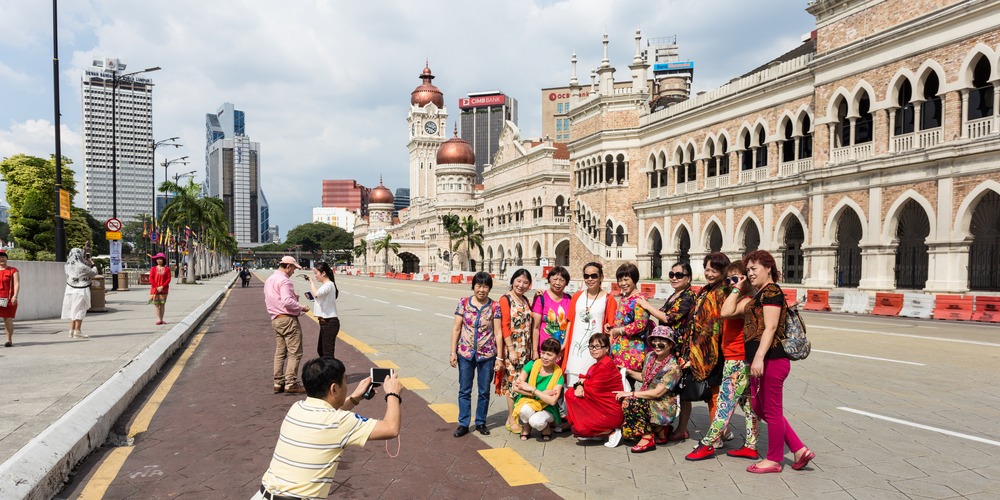What about Arabian Gulf tourists? Malaysia prepares to reopen borders to Asian neighbours first
KUALA LUMPUR - It is still not known when the big spenders of the Gulf Cooperation Council will be allowed into Malaysia for leisure travel, after authorities announced the country will prioritise arrivals from neighbouring countries once borders reopen.
Manoharan Periasamy, a senior director at Tourism Malaysia, announced on Wednesday (March 31) that nationals from Singapore, Thailand and Indonesia would be among the first to be allowed entry, possibly in the second quarter, due to the amount of traffic between the countries.
Arrivals from other key markets such as China, Japan and Korea are being considered for as early as the third quarter, though when the lucrative Arabian Gulf market will be allowed is yet to be decided.
“Eventually, we will move to Middle Eastern visitors as well, but this will take time. First, we need to know what will be the process,” said Manoharan during a virtual question and answer session.
Business travellers have been allowed to enter Malaysia throughout most of the pandemic, though they have had to endure strict SOPs, such as quarantining on arrival and providing the government with a detailed itinerary for the time they are on Malaysian soil. For now, though, the country has not committed to any dates for the reopening of its borders to leisure travellers of any nationality.
“The government is looking to review this through consultation with all the related agencies, industry and security authorities. For us we don't have any dedicated dates when we're going to open the border, but all of us are looking forward to it once cases are down and there is a controlled travel environment,” said Manoharan.
BIG SPENDERS
Gulf arrivals are extremely important for Malaysia’s fraught inbound travel industry, which saw only 4.3 million arrivals last year, equivalent to an 83.4% drop from the 26 million recorded in the year before the pandemic, according to figures revealed by Tourism Malaysia last month.
Dollar for dollar, visitors from Saudi Arabia, the United Arab Emirates and Kuwait bring in the most tourist receipts out of any national group.
Compared to an average of 3,300 Malaysian ringgit ($796) spent per arrival in Malaysia, visitors from Saudi, for example, are expected to spend almost seven times more after they disembark, Manoharan said.
Indeed, the top five biggest spending nationalities are all from Gulf countries, despite their relative low arrival numbers.
“The Gulf market contributed about 300,000 arrivals to Malaysia annually before the pandemic. They only made up about 1.2% of total arrivals at the time, but in buying terms, their impact is considered to be much larger,” said Shahrin Mokhtar, director of Tourism Malaysia in Dubai. "That is why for us they are very important, because of their spending power.”
Fazal Bahardeen, chief executive of halal travel consultancy CrescentRating, said Gulf arrivals will be fondly welcomed by the Malaysian hospitality industry, despite their relatively small numbers.
“As we go on to the opening phase of travel, it is not about quantities, but it is about the yield. Every dollar and every tourist will count,” he told Salaam Gateway.
“In the short to medium term, you aren’t going to get plane-loads of arrivals. Smaller markets will give you better focus and there will be ripple effects. It’s easier to open up smaller markets than trying to target huge ones.”
Another important factor to consider is airline connectivity after a year during which the airline industry has suffered above most others.
With airlines such as Emirates, Qatar Airways and Saudia cushioned by state or quasi-government ownership and support, they are better placed to recover connectivity as destinations re-open.
"If there is one region that will see its airlines return to normal more than anywhere else, it’s the Middle East. That’s a real strength for places like Malaysia to see how those airlines reconnect,” said Fazal.
REVENGE TOURISM
If Tourism Malaysia’s hopes are realised and the first arrivals disembark by the mid-point of the year, the agency anticipates sound numbers.
If this is delayed until later in the year, it is banking on so-called “revenge tourism”, which describes the burning need of travellers to pack a case and get on a plane after many months of lockdown.
“I think we are all hoping for revenge travelling. Everybody is waiting and eager to get out,” said Shahrin. “Now there are more flexible packages and you can change the timing of your bookings depending on when the border is opened. We are looking forward to this. Good luck to all of us!”
Despite the disruption to Malaysia’s travel industry and is sluggishness to open up relative to other Islamic markets, Tourism Malaysia doesn’t anticipate any threats to the country’s leading position as a Muslim-friendly travel destination.
While Malaysia has been in lockdown, other countries have been courting tourists or are preparing to begin welcoming them imminently.
For instance, Turkey is open to tourists, as is Dubai, which is now actively promoting itself as a major destination, while Indonesia has announced it will aggressively initiate tourism recovery with plans for safe “green zones” for leisure visitors by the mid-point of this year.
“We have to follow the procedures and make sure that our country is safe before we open our borders. Because Malaysia has been known as a halal destination for a long time, I don't think that we will be left far behind on that front,” Shahrin told Salaam Gateway.
© SalaamGateway.com 2021 All Rights Reserved
